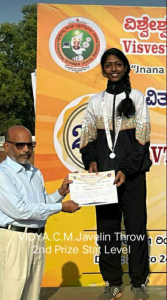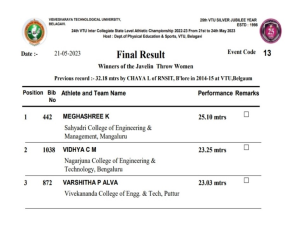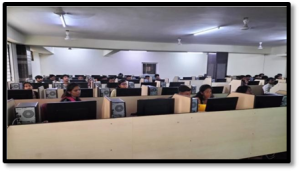- About Course
- Vision & Mission
- PEO's PO's & PSO's
- HoD's Message
- Programme Details
- Faculty
- Board Of Studies
- Research & Publications
- Scheme & Syllabus
- Consultancy
- Facilities
- Activities
Civil Engineering is a prominent branch of engineering that deals with infrastructural development of the country. The department of civil engineering was established in the year 2004. The Department has well equipped laboratories for teaching, R & D and industrial consultancy works. It also offers consultancy and testing services in the field of Civil Engineering. Department of Civil Engineering is headed by Dr.G.SRILAKSHMI
It aims to transform as leader in technical knowledge by providing excellent academic environment for the students which helps in grooming for innovative and challenging future in turn contribute for development of the nation
- NCET has been granted Autonomous statues under VTU.
- Department is Accredited by NBA and NAAC with A+ grade.
Vision
To transform the students as leaders in Civil Engineering to achieve professional excellence in the challenging future
Mission
M1: To provide the Civil Engineering knowledge and skills for students through an excellent academic environment.
M2: Adopting innovative teaching techniques using modern engineering tools for designing, modeling and analyzing the societal and environmental problems.
M3: Developing Communication skill, leadership qualities through team work and skills for continuing education among the students.
M4: To inculcate moral, ethical and professional values among students to serve the society.
M5: Validate engineering knowledge through innovative research projects to enhance their employability and entrepreneurship skills.
PROGRAM OUTCOMES (PO’s)
- PO-1: Engineering Knowledge – Apply the knowledge of mathematics, science, engineering fundamentals, and electronics communication principles to the solution of complex problems in Civil Engineering.
- PO-2: Problem Analysis – Identify, formulate, research literature, and analyze complex electronics communication and engineering problems reaching substantiated conclusions using first principles of mathematics and engineering sciences.
- PO-3: Design/Development of Solutions – Design solutions for complex Civil Engineering problems and design system components or processes that meet the specified needs with appropriate consideration for the public health and safety, and the cultural, societal, and environmental considerations.
- PO-4: Conduct Investigations of Complex problems – Use research-based knowledge and research methods including design of experiments, analysis and interpretation of data, and synthesis of the information to provide valid conclusions related to Civil Engineering problems.
- PO-5: Modern Tool Usage – Create, select, and apply appropriate techniques, resources, and modern engineering and IT tools including prediction and modeling to complex Civil Engineering activities with an understanding of the limitations.
- PO-6: The Engineer and Society – Apply reasoning informed by the contextual knowledge to assess societal, health, safety, legal and cultural issues and the consequent responsibilities relevant to the professional Civil Engineering practice.
- PO-7: Environment and Sustainability – Understand the impact of the professional Data Science & Engineering solutions in societal and environmental contexts, and demonstrate the knowledge of, and need for sustainable development.
- PO-8: Ethics – Apply ethical principles and commit to professional ethics and responsibilities and norms of the Civil Engineering practice.
- PO-9: Individual and Team work – Function effectively as an individual, and as a member or leader in diverse teams, and in multidisciplinary settings.
- PO-10: Communication – Communicate effectively on complex Civil Engineering activities with the engineering community and with society at large, such as, being able to comprehend and write effective reports and design documentation, make effective presentations, and give and receive clear instructions.
- PO-11: Project management and finance – Demonstrate knowledge and understanding of the engineering and management principles and apply these to one’s own work, as a member and leader in a team, to manage Data Science & Engineering projects and in multidisciplinary environments
- PO-12: Life Long Learning – Recognize the need for, and have the preparation and ability to engage in independent and life-long learning in the broadest context of technological change.
PROGRAM SPECIFIC OUTCOME (PSOs)
- PSO-1: To carryout surveying, prepare layout plans, maps for structures and alignments for canals and roads.
- PSO-2: To specify, analyze, design, estimate and supervise construction activities such as, test and evaluate foundations and superstructures for buildings, industries, irrigation and hydraulic structures, highways, railways, airports, docks and harbors.
- PSO-3: To understand the impact of water, air and noise pollution; the methods of waste collection, disposal and processing; specify, design and analyze water supply system, sewerage and industrial effluent conveying and treatment systems.
PROGRAM EDUCATIONAL OBJECTIVES (PEOs)
- PEO-1: Graduates in Civil Engineering will apply the technical knowledge for sustainable societal growth.
- PEO-2: Graduates of Civil Engineering will demonstrate designing, modeling and analyzing skills.
- PEO-3: Graduates in Civil Engineering will demonstrate good communication skills, dynamic leadership qualities with concern for environmental protection.
- PEO-4: Civil Engineering graduates will be capable of pursuing higher studies, take up research and development work blended with ethics and human values.
- PEO-5: Create, select, and apply appropriate techniques, resources, and modern engineering tools such as CAD, FEM, GIS, etc. including prediction and modeling to complex Civil Engineering activities with an understanding of the limitations.
HoD's Message

Dr. H.S.Govardhana Swamy
Head of the Department
I hearty welcome all the students and their parents to the Department of Civil Engineering. Civil Engineering is an essence of today’s world. We are committed to provide not only the technical education to our students but also the leadership qualities through which they can create employment to others.
During study at the department, the students are encouraged to get hands-on experience in the corporate world through internship projects with reputed organizations. We believe that our students have been well accepted in their job profiles and have consistently exceeded expectations of the corporate world. In their curriculum they are encouraged to take up mini projects to supplement theoretical knowledge with practical experience.
We provide an opportunity for students to work as members of a team to organize events such as IKYA (a cultural fest), participate in workshops, technical and cultural fests organized by other colleges and also get involved in activities of social relevance.
I congratulate the faculty members and the students for their brilliant efforts. I wish all the Students and Faculty a great academic career.
Course Name | B.E in Civil Engineering ( 4 Years ) |
Intake | 60 |
Accreditation Status | Accredited by AICTE |
Professional Society Memberships | ICI student Chapter, ACCE(I), IGBC |
Professional Activities | Internship, ISRO Outreach Programmes, Seminars, Alumni talk, workshops, Expert Talks, Guest Lectures, Training Program and FDPs are conducted regularly |
Consultancy Activities | Consultancy activities per year is more than 12027.83 US$ |
| Sl. No | Staff Name | Designation | Qualification |
| 1 | Dr. B. V. Ravishankar | Professor & Principal | B.E., M.E., Ph.D. (IISC, Bangalore) |
| 2 | Dr. H S Govardhana Swamy | Professor & HoD | B.E., M.Tech., Ph.D. (Anna University) |
| 3 | Dr. Ramesh. P. S. | Professor | B.E., M.E., Ph.D. (VTU, Belagavi) |
| 4 | Dr. Nagaraj V.K. | Associate Professor | B.E., M.Tech., Ph.D. (VTU,Belagavi) |
| 5 | Dr. Manjunath Itagi | Associate Professor | B.E., M.Tech., Ph.D. (UVCE, Bangalore) |
| 6 | Mr. Sanath Kumar. K. R. | Assistant Professor | B.Sc., M.Sc |
| 7 | Mr. Sujith. S. K. | Assistant Professor | B.E., M.Tech., (Ph.D.) |
| 8 | Mr. Shashikiran. S. | Assistant Professor | B.E., M.Tech. |
| 10 | Mrs. Vidyashree. M. | Assistant Professor | B.E., M.Tech. |
| 11 | Ms. Vidyashree. M. G. | Assistant Professor | B.E., M.Tech., (Ph.D.) |
| 12 | Ms. Chaya. S. | Assistant Professor | B.E., M.Tech. |
| 13 | Ms. Deepika. N. M. | Assistant Professor | B.E., M.Tech., (Ph.D.) |
Dr. Srilakshmi G
B.Tech, M.Tech, Ph.D.
Professor and Head
+91-9110666902
dr.srilakshmi@ncetmail.com
Dr. Ramesh P S
B.E, M.E, Ph.D
Professor
9845679155
rameshpobbi2019@ncetmail.com
Dr. Manohar D R
B.E. M. Tech. Ph.D.
Associate Professor
+91-9980604164
manoharram24@ncetmail.com
Dr. Nagendra
B.E. M. Tech. Ph.D
Associate Professor
+91-9742402476
drnagendra.reddy@ncetmail.com
Mr. Shashikiran S
B.E. M. Tech
Assistant Professor
+91-9611912009
shashikirans@ncetmail.com
Ms. Chaya S
B.E. M. Tech
Assistant Professor
+91-7760318490
chaya.sdl@ncetmail.com
Ms. Kanchan B G
B.E. M. Tech
Assistant Professor
+91-9060309997
kanchan.bg@ncetmail.com
Dr. C P Ramesh
B.E, M.E, Ph.D.
Professor
9844374166
dr_ramesh.cp@ncetmail.com
Dr. Nagaraj V K
B.E. M. Tech. Ph.D.
Associate Professor
+91-9980931905
naga@ncetmail.com
Mr. Sanath Kumar K R
B.Sc., M.Sc.
Sr. Assistant Professor
+91-9483813599
sanathkumar18@ncetmail.com
Mrs. Vidyashree M
B.E. M. Tech
Assistant Professor
+91-9620233855
vidyashreem@ncetmail.com
Ms. Vidyashree M G
B.E. M. Tech
Assistant Professor
+91-9591323455
mgvidyashree@ncetmail.com
Mr. Nischith Nirmal Raj
B.E. M. Tech
Assistant Professor
+91-8746910330
nischith.raj@ncetmail.com
Dr. Lairenlakpam Pinky Devi
B.E. M. Tech. Ph.D.
Associate Professor
+91-9789075422
pinkydevi@ncetmail.com
Dr. Manjunath Itagi
B.E. M. Tech. Ph.D.
Associate Professor
+91-9108911120
drmanjunath.itagi@ncetmail.com
Mr. Sujith S K
B.E. M. Tech
Assistant professor
+91-7892968171
sujithsk@ncetmail.com
Mrs. Chaitra D M
B.E. M. Tech
Assistant professor
+91-9986861852
chaitradm@ncetmail.com
Ms. Thanusha
B.E. M. Tech
Assistant professor
+91-9740262771
thanusha@ncetmail.com
Ms. Deepika N M
B.E. M. Tech
Assistant professor
+91-8660523212
deepika.nm@ncetmail.com
Sl. No | Name | Designation | Role |
1 | Dr. H S Govardhana Swamy | Professor & Head, Department of Civil Engineering, NCET, Bengaluru. | Chairman |
2 | Dr. Bharathi Ganesh | Professor Department of Civil Engineering, NMIT, Bengaluru. | Member (External – VTU Nominee) |
3 | Dr. Radhakrishna | Professor/ HOD, Department Civil Engineering, RVCE, Bengaluru. | Member (External-Academia) |
4 | Dr. Lakshmi C | Professor Department Civil Engineering, SJBIT, Bengaluru | Member (External-Academia) |
5 | Er. Ravi S | Technical Director, Enstructura Consultants Pvt. Ltd., Bangalore | Member (External from Industry) |
6 | Dr. Partha Sarathy | Managing Director, Sarathy Associates Jayanagara, Bengaluru | Member (External from Industry) |
7 | Er. Karthik Patel M G | Senior Project Engineer Sri Sathya Sai University for Human Excellence, Kalaburgi, Karnataka. | Member (Illustrious Alumni) |
8 | Dr. Ramesh P S | Professor | Internal Member (BOS Coordinator UG & PG) |
9 | Dr. Nagaraj V K | Associate Professor | Internal Member |
10 | Mr. Sanath Kumar. K. R | Assistant Professor | Internal Member |
11 | Mr. Sujith S K | Assistant Professor | Internal Member |
The Department of Civil Engineering has established a very good relationship with the industries to reduce the gap between theory and practice. Faculty members from the department of Civil engineering lend their expertise and proficiency to help many industries to carry out complex designs and to arrive at practical solutions to special problems.
The sponsoring agencies include Central Pollution Control Board (CPCB), Karnataka Pollution Control Board (KSPCB), National Highway Authority of India, Water Institute, The Urban Learning Internship Program (TULIP), Bharat Ratna Sir M Visvesvaraya National Training Facility for Skills for All (BMVNTFSA), Private Industries etc.,. The institute takes consultancy on various projects from the department include PWD, Panchayath Raj Engineering Department, KRIDL, Nirmithi Kendra, Rural Water supply & Sanitation, Trivik, Bagmane Tech Park, NCCCL, JMC, Nin Percept, South Western Railways, Bengaluru, NCC.Ltd, Jampana Constructions, Aruna Constructions, NCC Urban and other private companies.
Sl. No | Financial year | Consultancy Amount Generated |
1 | 2021-22 | Rs. 1,93,000 (Aug 21 to March 22) |
2 | 2022-23 | Rs. 2,92,500 (April 22 to March 23) |
3 | 2023-24 | Rs. 13,00,000 (March 23 to as on 15/1/2024) |
Basic Material Testing laboratory is introduced in third semester civil engineering and it is mainly based on the material testing of building materials like Fine Aggregate, Coarse Aggregate, Steel, Brick and Wood etc. This lab will enhance students to learn about the behaviour of different materials used for the construction. The different experiments which are conducted in the lab are Specific Gravity, Fineness modulus and grain size distribution, bulking of Fine aggregates, Izod and Charpy test, Hardness number for different materials, Compression and Tension test on ductile material, Bending test on wood, Compressive strength of Brick. By the end of the laboratory program student will able to understand the behaviour of construction material according IS code.
- Universal testing machine.
- Brinell’s Rockwell and Vicker’s metal testing machine.
- Torsion testing machine.
- Shear shackle.
- Sieve shaker.
- Tile testing machine.
- Compression Testing Machine
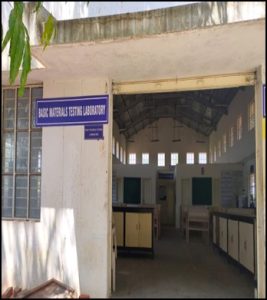
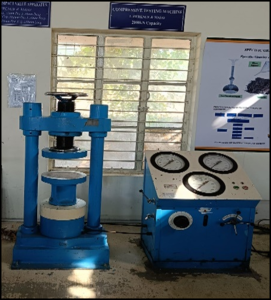
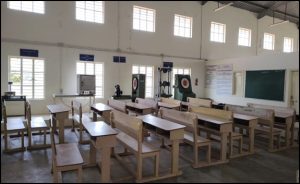
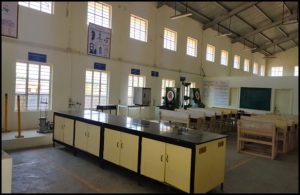
Computer-aided design (CAD) is the to aid in the creation, modification, analysis, or optimization of a design. CAD software is used to increase the productivity of the designer, improve the quality of design, improve communications through documentation, and to create a database for manufacturing. Advanced civil engineering software’s are procured for making the students globally competitive and industry ready. At CAD lab, students get professional training on 2D & 3D drafting of civil engineering drawings using the latest version of Autocad software. Student will learn computer aided design layout and 3D solid modelling definition. Students will also gain the knowledge of design and drafting needed for civil engineering discipline.
This lab is well equipped with the following software are:
- Computers-60.
- AUTOCAD,
- STADD Pro.
- E tabs Software.
- MSP Software.
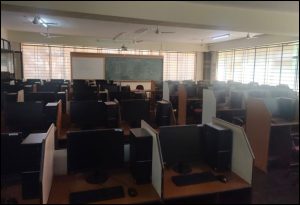
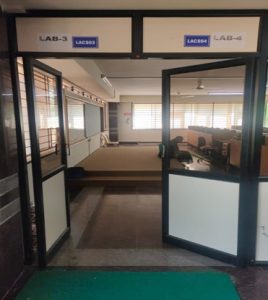
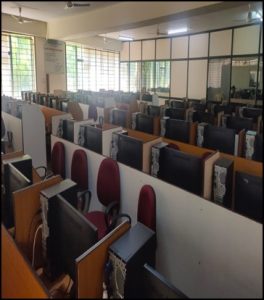
This lab helps in selecting and evaluating construction materials for their suitability for construction with regards to quality and performance as required by Indian Standards codal provisions.
This Lab is also extensively used for conducting research in thrust areas and consultancy works.
The major equipments of the laboratory:
- Vicat needle apparatus.
- Air permeability apparatus.
- Slump test apparatus.
- Vibrating machine
- Rebound Hammer
- UPV
- Vibrating table.
- Compaction factor apparatus
- Cylindrical measure
- Vee-Bee consistometer
- Pycnometer
- Ductility test apparatus
- Flash and fire point apparatus
- Penetrometer with automatic timer and accessories
- Field density test by sand replacement apparatus
- California bearing ratio apparatus
- Aggregate crushing apparatus with mould and accessories
- Abrasion test Los angles abrasion testing machine
- Aggregate impact value apparatus.
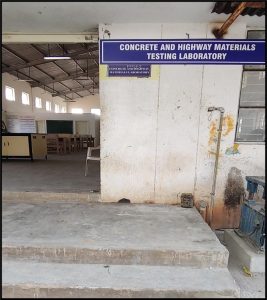
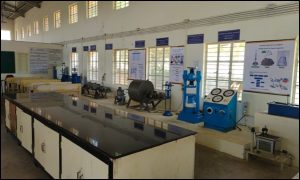
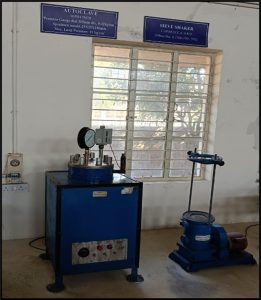
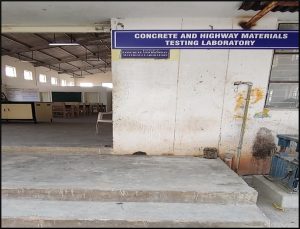
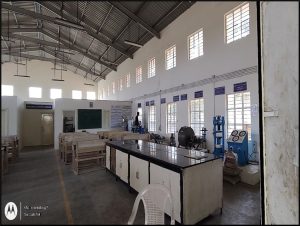
Hydraulics and Hydraulic Machinery lab is concerned with kinetics, kinematics of fluids and hydraulic machines. Fluid mechanics laboratory is introduced in fifth semester. In this laboratory students become familiar with how to measure discharge through various measuring devices, estimate the major loss of head in pipe flow, analyze the impact of jets on various types of vanes and evaluate performance characteristics of turbines and pump.
This lab is well equipped with the following experimental set up:
This lab is well equipped with the following experimental set up:
- Pelton and francis turbines.
- Centrifugal pump constant speed.
- Centrifugal pump variable speed.
- Venturimeter
- Venturiflume
- Notches
- Weirs
- Major and minor friction losses apparatus.
- Orifice
- Collecting tank apparatus.
- Impact of jet on vanes
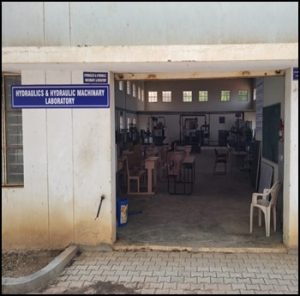
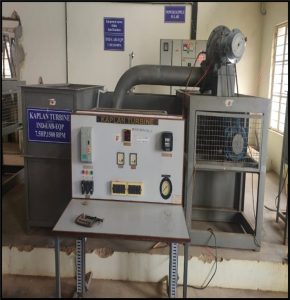
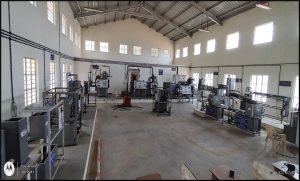
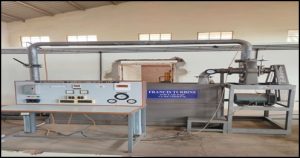
Geotechnical Engineering is the branch of civil engineering concerned with the engineering behaviour of earth materials. Geotechnical Engineering Laboratory is introduced in seventh semester. In this laboratory students become familiar with how to investigate subsurface soil conditions, determination of index and engineering properties of soils and determination of Safe bearing Capacity of soil.
This lab is well equipped with the following experimental set up:
- Triaxial test apparatus
- Direct shear test apparatus
- Unconfined testing apparatus
- CBR apparatus
- Relative density apparatus
- Consolidation apparatus
- Swell test apparatus
- Permeability apparatus
- Casagrande’s apparatus etc.
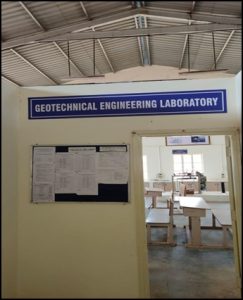
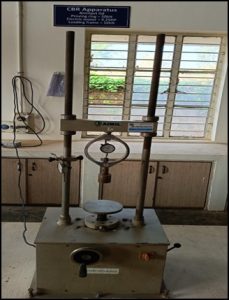
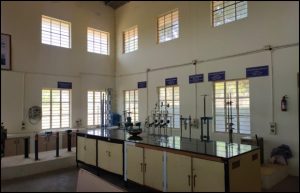
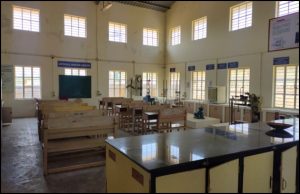
Environmental engineering is a branch of civil engineering concerned with the study of water and wastewater. The environmental engineering laboratory is introduced in the sixth semester. The Laboratory has all the state-of-the-art facilities for conducting various tests for determining the quality of potable and waste water. The undergraduate students are encouraged to take up topics in the field of Environmental Engineering for their project work by making use of facilities available in the laboratory. Analysis and testing of water and wastewater samples are being regularly done for various public and private agencies.
This lab is well equipped with the following experimental set up:
- BOD incubator
- Autoclave
- Photo electric calorimeter
- Muffle furnace
- Desiccator
- Dissolved oxygen meter 141 (Oxygen analysers)
- Direct reading conductivity meter
- Bunsen burner
- Voltage stabilizer
- Hot water bath
- Jar test apparatus
- Flame photometer
- Spectrophotometer
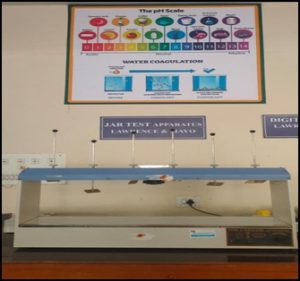
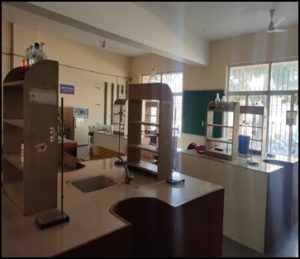
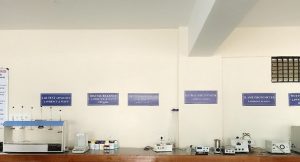
Survey Practice trains students in planimetric and relief survey over small areas. Students attain Skills for Using Surveying Instruments Including, Levelling Instruments, Plane Tables, Theodolite, and Compass. The successful completion of the course will give the valuable insights about the application of basic principles of engineering surveying and for linear and angular measurements. Determine the level of ground surface and Calculation of area and volumes. Operate theodolite for horizontal and vertical measurements. Which will also provide basic knowledge about principles of surveying for location, design and construction of engineering projects
This lab is well equipped with the following experimental set up:
- Pentax Total Station
- Auto level
- LYNX Standard Vernier Theodolite
- Planimeter
- Optical square
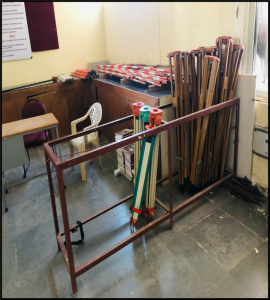
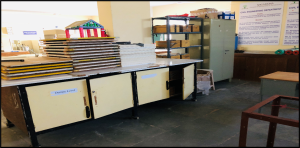
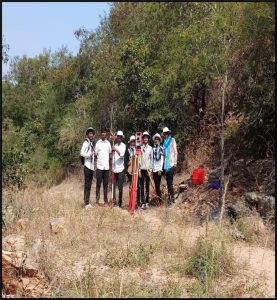
This course emphasizes on the study of various types of rock formation and its physical properties. Topics such as rocks and minerals, soils, and earthquake activities are discussed with special reference to local geological problems. This lab course also focuses on physical properties of minerals. Engineering geology also seeks to identify potential geologic hazards/ geologic structures that could impact engineering structures.
This lab is well equipped with the following experimental set up:
- Electrical resistivity meter
- Mineral specimens.
- Rock specimens.
- Petrified rock.
- Polished construction flooring material.
- Handheld GPS
- Compass clinometer
- Brunton compass
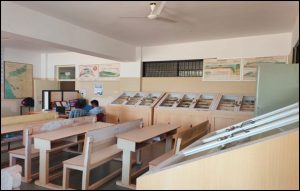
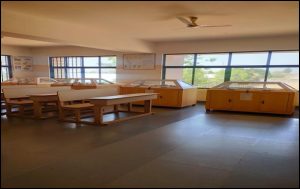
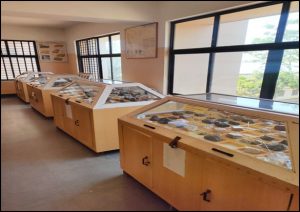
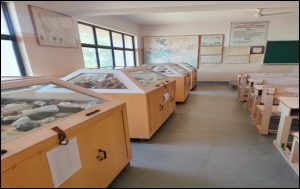
IIC and Department of civil Engineering in association with Indian Concrete Institution organized Field visit for V & VII sem students on Problem Identification in Precast concrete Yard at K2K infrastructure Ltd (Prestige Group) on 17/01/2024. A precast concrete yard is a specialized facility dedicated to the production, storage, and distribution of precast concrete elements. The objective of this program is to bring awareness to the students on the problems of a precast yard and to suggest improvement measures.
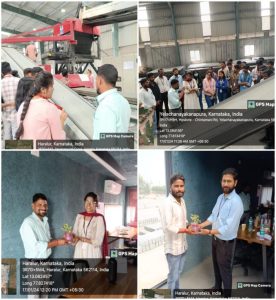
Inauguration of Indian Concrete Institute student chapter on 19th December 2023 coordinated by Dr. NAGARAJ V K, L PINKY DEVI, Ms. VIDYASHREE M G
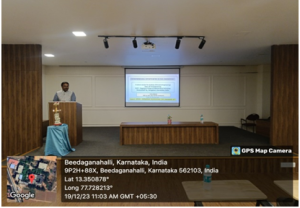

Department of civil Engineering, NCET inaugurated ICI student chapter on 19th December 2023. Chief guest of the function was Er. H R Girish, Hon. Chairman, ICI-Bengaluru Centre, Managing Director and CEO of M/s Girish Ventures. The function was coordinated by Dr. NAGARAJ V K, L PINKY DEVI, Ms. VIDYASHREE M G
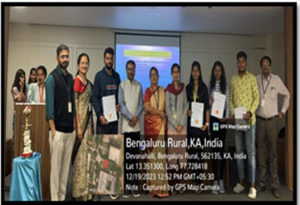
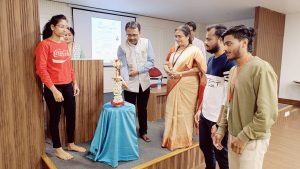
Department of Civil Engineering organized Training on Wheels “Gypsum Plasterboards used in the Interiors for Partitions and Ceilings” by Mr. Umashankar Kuri, Divisional Manager, Aftab Khanum, Specification Manager, USGKNAUF and Mr. Praful J Kademani, Technical Service-lead, USGKNUF on 21st December 2023 by coordinated by Dr. Manohar D R
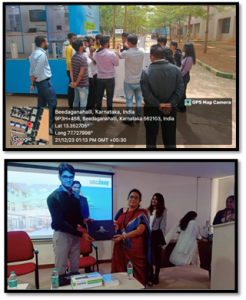
Institution Innovation Council and Civil Engineering in association with Indian Concrete Institute (ICI) and Internal Quality Assurance Cell organized National Pollution Control Day 2023 with the Theme “Sustainable Development for Clean and Healthy Planet” on 2nd December 2023. The Chief Guest Mr. D R Kumaraswami Director, Prakruthi Institute of Environmental Studies & Ex Chief Environmental Officer- Karnataka State Pollution Control Board, spoke about various pollutantsand the challenges towards Sustainable development for a clean and healthy planet. Dr. B V Ravishankar, Principal, NCET recalled the Bhopal Gas tragedy and emphasizedon the need for prevention rather than controlling the pollution.


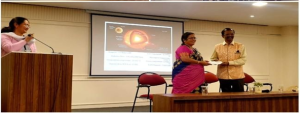
Objective:
To identify and support the development of modern technologies that can help create a cleaner and greener environment. To boost and augment the Swachh Bharat Mission and Smart Cities Project by leveraging science, technology, and innovation.
Activity Details:
Department of civil engineering and basic science organized waste to wealth exhibition as a part of comprehensive continuous evaluation in “Waste management” course on 7-12-2023 for 1st year students, Coordinated by course teachers Ms Vidyashree M G and Ms Thanusha.
Students exhibited different ideas on reuse, recovery, recycle and reduce concepts. They also had audio and video presentation on 4R’s concept of waste management. Few ideas executed by the students includes, recycle of coconut shells to coffe mugs, recycle & reuse of dry wastes into pencil, pen, books, reuse of waste cloths into new shirts, reuse of newspaper, broken tempered glasses, reuse of PVC pipes to make chandrayan 2, used glass bottles, recycle of waste paper, plastics, vertical garden. Also executed models on vermi composting waste, waste water treatment, solar clock, reuse of plastic as bricks, hauled container, global warming, AI in waste management, biogas production, smart waste management, industrial waste water treatment, production of manure from dead animals.
No of student participants | 241 |
No of student teams | 48 |




Ms. Deepika N M has participated in Climate Innovations Quiz.
Ms. Deepika N M, Assistant Professor, Department of Civil Engineering has participated in Climate Innovations Quiz organized by Green Terre Foundation in Association with AICTE on 21st November 2023.
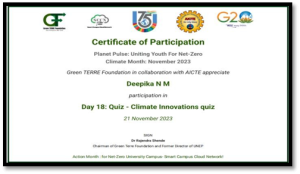
Mr. Sanath Kumar has completed a MOOC Course.
Mr. Sanath Kumar, Assistant Professor, Department of Civil Engineering has completed a Six Weeks MOOC on “GIS for Climate Action” under the platform Esri -The Science of Where and received certificate on 8th November 2023.
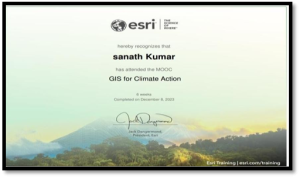
Dr. Nagendra, Associate Professor, Department of Civil Engineering has been recognized as Reviewer for “Sustainable Water Resources Management” Spring Nature on 9th November 2023.
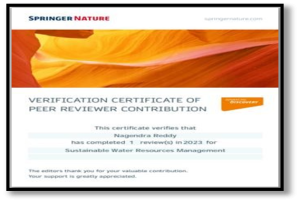
Ms.Deepika N M has participated in Faculty Development Programme.
Ms. Deepika N M, Assistant Professor, Department of Civil Engineering has participated in five days Faculty Development Programme on “2nd Series of Advancements in Concrete Technology (AICT-2023) organized by Department of Civil Engineering, Bellari Institute of Technology and Management, Bellari during 2nd to 7th November 2023.
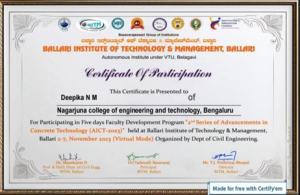
Internship of Civil Engineering Students.
Students of 5th and 7th Semester, Department of Civil Engineering are going Internship Programme at BMRCL, NCC Ltd., Bengalore and NCET Construction Site in the month Nov 2023.
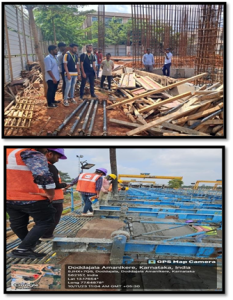
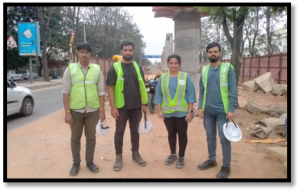
In continuation with the MoU, E waste collection day at NCET campus by Ms. Vidyashree M G month of Nov 2023.
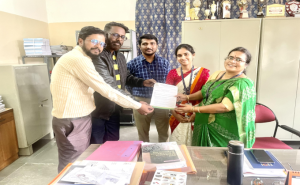
Dr. NAGARAJ V K had taken 1st year Civil Students to site visit at NCET Campus to show centerline marking, excavation work and different types of footing on 11 October 2023.
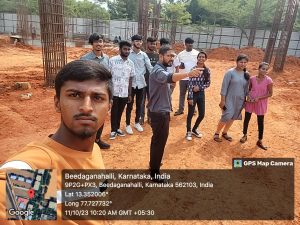
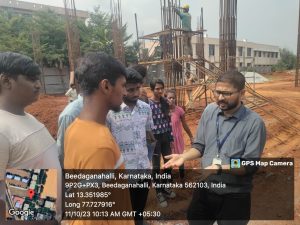
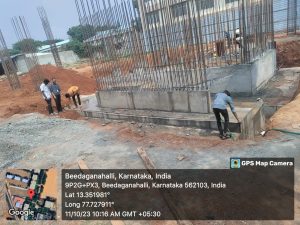
Dr. Nagaraj V K was selected as mentor for the Bootcamp sessions on Entrepreneurship and Growth Opportunities, UNDP Sponsored Code Unnati Entrepreneurship Bootcamp Session organized at at R L Jalappa Institute of Technology on 19th and 20th October 2023.
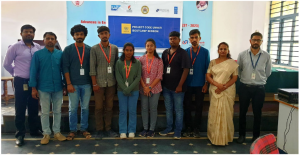
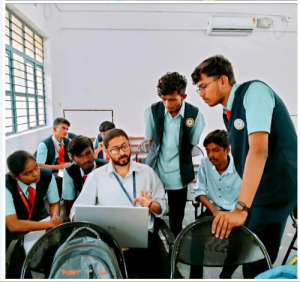
Mr. Sanath Kumar, Assistant Professor, Department of Civil Engineering has completed a Six Weeks MOOC on Spatial Data Science: The New Frontier in Analytics and received certificate on 5th October 2023.
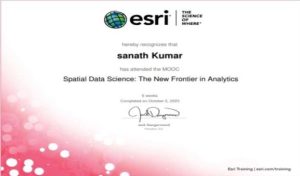
Department of Civil Engineering organized Hands on Training on “Block Work and Plastering Work” by Trainer Mr. Shivaranjan N S, Director STAMBHA Infrastructure Private Limited on 14th August and 21st August 2023. On First Day Practical session was conducted on construction of wall for both 6th and 4th semester students at our campus Coordinatedby Dr. Nagaraj V K & Dr. L Pinky Devi.
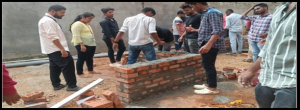
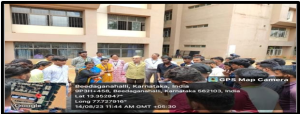
Dr. NAGARAJ V K and Ms. DEEPIKA N M, Hands-on training on “BASICS OF STAAD PRO” in association with Indian Concrete Institute one day Hands on Training on Autocad & Stadd Pro software by Er. Manjunth Bhattacharya on 23/07/2023 for VI Semester students.
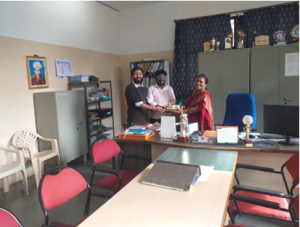
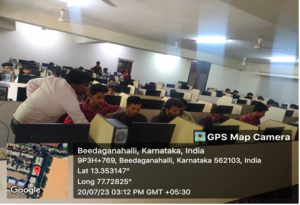
4th & 6th semester students, A site visit is organized to Bangalore Traffic Control Board located at Vasanth Nagar, Bangalore on 11/07/2023 by Mrs. Vidyshree M
A Site Visit was organized to Bangalore Traffic Management Centre with 55 students from 4th and 6th semesters of Civil Engineering Department, NCET. The Bangalore traffic Management Centre as India’s first Delta display screen for the purpose of analyze of mobility data and collection of dynamic traffic information throughout the Bangalore. Through this site visit the students got the knowledge about real – time analysis of traffic data, methods of collection of traffic information from different locations, about automatic traffic counter & classifier, area traffic Signal Control System and awareness about traffic rules.
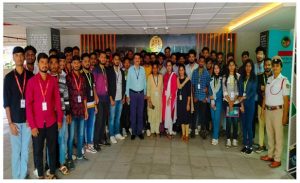
Department of Civil Engineering has organized hands-on training on sketch up on27/05/20234th and 6th Sem student were participated in the training program. The program was co=ordinated by by Mrs. Chaitra DM & Ms. Thanusha
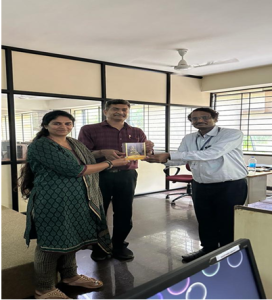
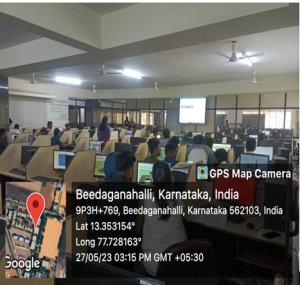
Ms. Vidya C.M USN1NC19CV074, student of civil engineering department got Silver medal in javelin throw event VTU State level athletic championship organized by VTU Belagavi on 21st May 2023.
